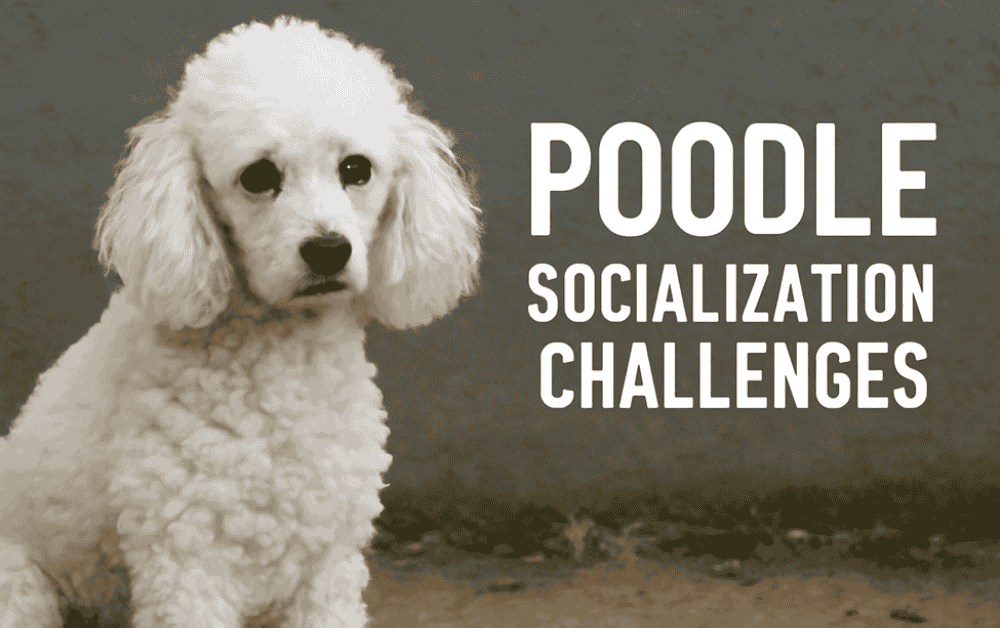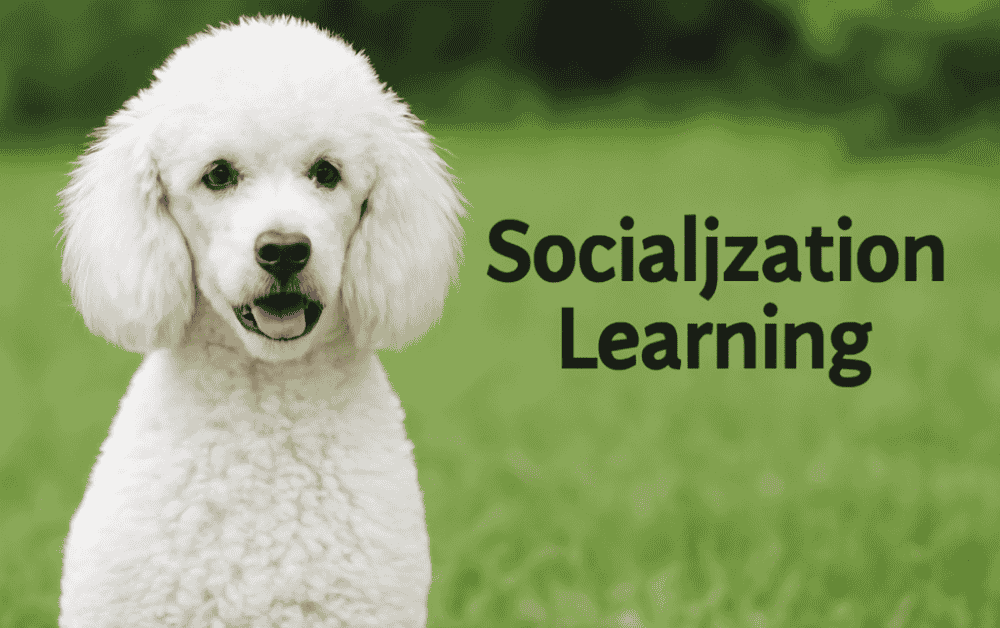Socializing your poodle is essential for their well-being. Poodles are smart and sensitive dogs, and they need the right experiences to develop good behavior and confidence. Proper socialization helps them handle new situations, people, and other animals without fear or aggression. A well-socialized poodle feels more comfortable in different environments and builds stronger bonds with you. Socialization also encourages your dog to be more responsive and better trained, making your relationship with them even stronger. Consistent socialization will make your poodle a confident and well-behaved companion.
How to Socialize a Poodle

Preparing for Socialization
Before you begin socializing your toy poodle, make sure their health is in check. Ensure that their vaccinations are up-to-date. This helps protect them from diseases that could be spread in public places. Next, start socialization in a safe and controlled environment. Begin with quieter places where your poodle can gradually get used to new experiences without feeling overwhelmed. This will make the process smoother and less stressful for your dog.
Introducing New Experiences Gradually
To help your poodle get comfortable with the world, start by meeting different people. Expose them to people of all ages, looks, and behaviors. This helps your poodle feel comfortable with all kinds of individuals. Next, take your poodle to new places. Start with parks, city areas, and even car rides. This will help them adapt to different environments and feel more confident.
Lastly, introduce your poodle to everyday sounds and objects at home. Let them get used to noises like the vacuum or doorbell. Also, show them items like bags or toys. This will help reduce their fear of new things.
Encouraging Positive Interactions with Other Dogs
Start by arranging playdates with well-socialized dogs. Make sure the dogs are vaccinated and friendly. This way, your poodle will learn how to interact with other dogs positively and appropriately. Pay close attention to your poodle’s body language during these interactions. Watch for signs of comfort, like wagging tails or relaxed posture. Also, be mindful of signs of stress, like stiff body language or growling. Understanding these signals will help you guide the interactions and ensure they are positive.
Utilizing Positive Reinforcement Techniques
Positive reinforcement helps your miniature poodle learn good behavior by associating it with something they enjoy. Here’s how you can use it effectively:
- Reward-Based Training: Reward your poodle with treats and praise when they display good behavior. This encourages them to repeat the behavior. For example, if your poodle greets someone politely, immediately offer a treat and say something like “Good job!” This creates a strong connection between good behavior and rewards.
- Clicker Training: A clicker is a tool that makes a sound when pressed. You can use it to mark the exact moment your poodle does something right. Once they hear the click, immediately give them a treat. This helps them understand which action is being rewarded. Clicker training is especially effective when teaching complex tasks, as it gives instant feedback to your dog.
By using these methods, your poodle will be more eager to repeat positive behaviors, helping them grow into a well-behaved and happy companion.
Enrolling in Puppy Classes
Puppy classes offer a structured environment where you can teach your poodle basic commands and socialization skills. Here’s how they help:
- Structured Learning: You can take your poodle to puppy classes to learn obedience commands like sit, stay, and come. These classes also provide controlled socialization with other dogs and people. Your poodle will become more comfortable in various situations, preventing future behavior issues.
- Community Building: By joining puppy classes, you get the chance to connect with other dog owners. You can share experiences, strategies, and tips to address common puppy challenges like biting or potty training.
Puppy classes help you build a strong foundation for your poodle’s training and make it easier to raise a well-behaved dog.
Optimal Timing
The ideal time to begin socializing your poodle is between 3 to 14 weeks of age. This is considered the critical socialization window, during which your puppy’s brain is most receptive to new experiences. Experts agree that early socialization is key for preventing future behavioral problems. According to The Spruce Pets, this period is when puppies learn important lessons about how to interact with people, other dogs, and their environment (The Spruce Pets).
Developmental Impact
The experiences your poodle has during this critical period will shape how they react to new situations later in life. Positive interactions with various people, animals, and environments help your poodle develop into a confident and well-behaved dog. iHeartDogs points out that a lack of exposure to different stimuli can lead to fearful or aggressive behaviors as your poodle matures (iHeartDogs). Socialization during this window helps your poodle learn how to handle stress and uncertainty, leading to a better-adjusted adult dog.
By starting socialization early and ensuring a variety of positive experiences, you set your poodle up for a lifetime of confidence and good behavior.
Addressing Poodle Socialization Challenges

Socializing your poodle can come with a few hurdles. Dogs may react differently to new experiences, and it’s important to know how to help them through it. Here are two common challenges and how you can overcome them effectively.
Fearful Reactions
Fearful reactions can happen when your poodle feels overwhelmed. Look for signs like cowering, trembling, or avoiding new people or situations. When you notice these behaviors, don’t force your dog into the situation. Instead, let them take their time. Gradually introduce them to new things, and they will begin to build confidence.
Overcoming Setbacks
Setbacks are normal, and they don’t mean you’ve failed. If your poodle has trouble in certain situations, take a step back. Slowly reintroduce the experience in smaller, manageable doses. This helps your dog get used to new situations at their own pace and can prevent further anxiety or stress. Stay patient and consistent, and your dog will gradually improve.
Continuing Socialization Beyond Puppyhood
Socializing your puppy doesn’t stop after puppyhood. It’s a lifelong process that you need to maintain to keep your dog well-adjusted and confident. Here’s how you can continue socialization as your poodle matures.
Lifelong Process
Socialization doesn’t end when your poodle reaches adulthood. Keep exposing them to new experiences, people, and environments. Regularly introduce your dog to different situations, and they’ll stay comfortable and adaptable in any scenario. Ongoing exposure will ensure your poodle remains confident throughout their life.
Advanced Training
After the basics, sign your poodle up for advanced obedience classes or involve them in activities like agility. These training sessions help sharpen their social skills and keep them engaged. They also offer chances to meet other dogs and people, ensuring your poodle stays well-socialized and mentally stimulated.
Tailoring Socialization to Your Poodle’s Personality

Every poodle has its unique temperament. Some are more outgoing, while others may be shy or reserved. It is important to adjust your socialization approach based on your poodle’s personality. For instance, a confident poodle might thrive in busy environments, while a more anxious one may need a quieter setting to start.
Monitor your poodle’s reactions as you introduce new experiences, people, and environments. Tracking their comfort levels helps you identify what works and what does not, so you can fine-tune your approach. Be patient and consistent, ensuring that socialization remains a positive experience.
Conclusion
Socializing your poodle is crucial for their well-being and happiness. By starting early, you help your poodle build confidence and reduce anxiety. Use positive reinforcement and reward-based training to encourage good behavior. Enroll your poodle in puppy classes for structured learning and socialization with other dogs. Remember, socialization is a lifelong process, so keep exposing your poodle to new situations. Tailor your approach based on their personality to ensure a positive experience. Your poodle will become a well-adjusted and confident companion with patience and consistency.
Read Also: Are Poodles Easy to Train
Read Also: Are Poodles Good Family Pets
FAQS About Poodle Socialization
How do I socialize my poodle if it’s shy?
Start by introducing your poodle to calm and quiet environments if your poodle is shy. Begin with a few people at a time and avoid overwhelming them. Gradually expose them to new people, places, and situations. Watch your poodle’s body language closely—if they seem stressed, slow down the process. Use positive reinforcement, like treats or praise, whenever they act confidently. This will help build their trust and encourage more social behavior.
Can I socialize my adult poodle, or is it too late?
It’s never too late to socialize your adult poodle. While early socialization is ideal, adult poodles can still learn to be comfortable around new people, animals, and environments. Start with gradual exposure to new situations. Keep things positive and at a pace your poodle is comfortable with. Use treats and praise to reward calm behavior. Your adult poodle can become more social and confident with time and patience.
At what age should I start advanced socialization with my poodle?
You can begin advanced socialization with your poodle once they have mastered basic training, usually around 6 months of age. Advanced socialization includes exposing your poodle to more challenging environments and situations, like larger crowds or unfamiliar animals. Enroll in obedience classes or involve your poodle in activities like agility. This helps them stay engaged, develop confidence, and refine their social skills.
How do I stop my poodle from being aggressive with other dogs?
If your poodle is aggressive with other dogs, start by controlling their environment. Arrange playdates with well-socialized dogs that are calm and vaccinated. Always supervise their interactions closely. Use positive reinforcement when your poodle shows calm, friendly behavior. If the aggression continues, consider professional training. It’s important to remain consistent and patient, ensuring your poodle learns the right way to interact with other dogs.
Are poodles more difficult to socialize compared to other dog breeds?
Poodles are generally not more difficult to socialize compared to other breeds. They are intelligent, eager to please, and often respond well to positive reinforcement. However, poodles are sensitive to negative experiences, so it’s important to avoid overwhelming them. The key is to socialize them slowly and consistently, tailoring the process to their personality. With patience and the right approach, poodles can be highly social and well-behaved.

